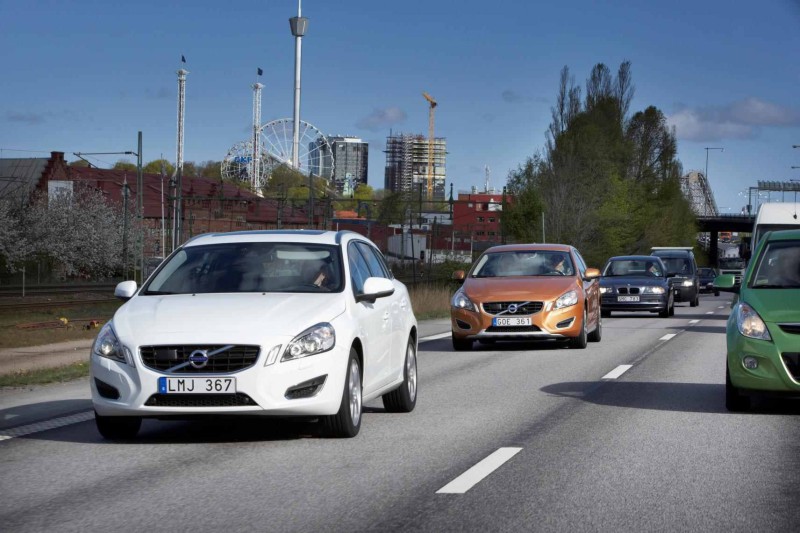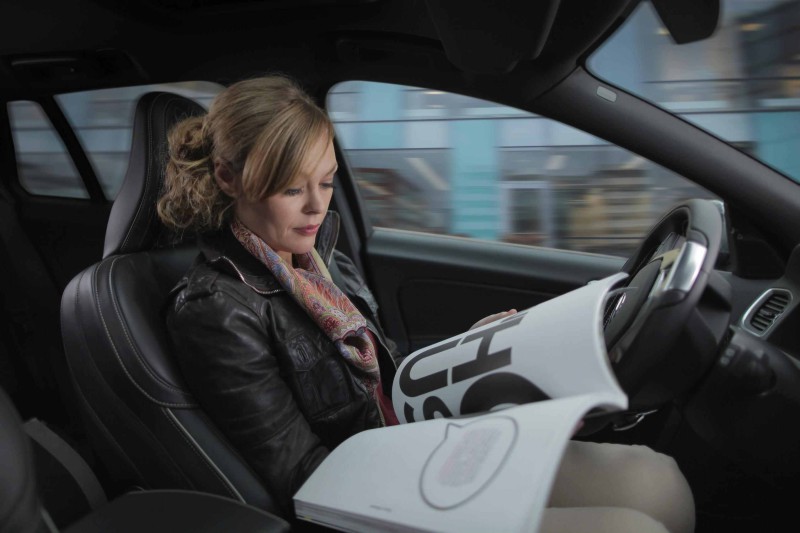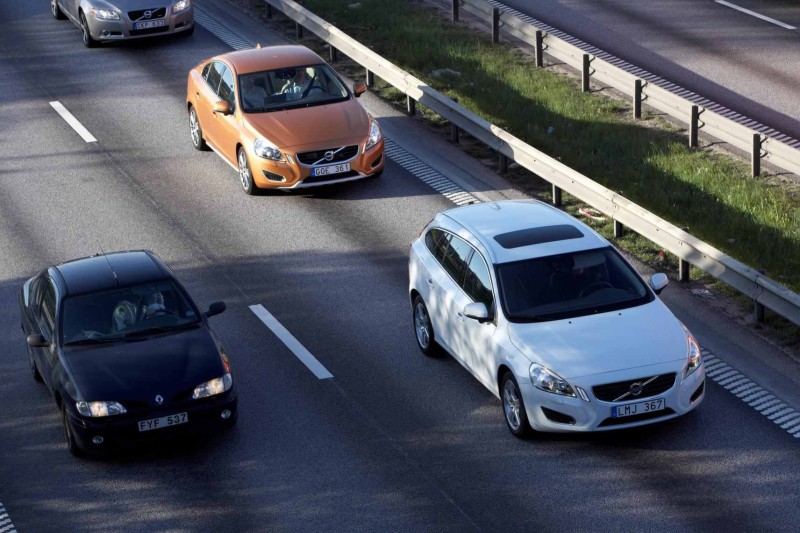Volvo
VOLVO CAR GROUP INITIATES WORLD UNIQUE SWEDISH PILOT PROJECT WITH SELF-DRIVING CARS ON PUBLIC ROADS
The ground-breaking project ‘Drive Me – Self-driving cars for sustainable mobility’ is a joint initiative between Volvo Car Group, the Swedish Transport Administration, the Swedish Transport Agency, Lindholmen Science Park and the City of Gothenburg.
The ‘Drive Me’ project is endorsed by the Swedish Government. The aim is to pinpoint the societal benefits of autonomous driving and position Sweden and Volvo Cars as leaders in the development of future mobility.
“Autonomous vehicles are an integrated part of Volvo Cars’ as well as the Swedish government’s vision of zero traffic fatalities. This public pilot represents an important step towards this goal,” says Håkan Samuelsson, President and CEO of Volvo Car Group. “It will give us an insight into the technological challenges at the same time as we get valuable feedback from real customers driving on public roads.”
The pilot will involve self-driving cars using approxima
“Our aim is for the car to be able to handle all possible traffic scenarios by itself, including leaving the traffic flow and finding a safe ‘harbour’ if the driver for any reason is unable to regain control,” explains Erik Coelingh, Technical Specialist at Volvo Car Group.
Focus areas:
The ‘Drive Me’ project will focus on a number of areas, such as:
◾How autonomous vehicles bring societal and economic benefits by improving traffic efficiency, the traffic environment and road safety
◾Infrastructure requirements for autonomous driving
◾Typical traffic situations suitable for autonomous vehicles
◾Customers’ confidence in autonomous vehicles
◾How surrounding drivers interact smoothly with a self-driving car
The project will commence in 2014 with customer research and technology development, as well as the development of a user interface and cloud functionality. The first cars are expected to be on the roads in Gothenburg by 2017.
Joining forces:
Recognising that growing urbanisation continues to put pressure on transport systems in and around urban areas all over the world, ‘Drive Me’ addresses the need to join forces in the quest to develop a sustainable society and mobility.
“The public pilot will provide us with a valuable insight into the societal benefits of making autonomous vehicles a natural part of the traffic environment. Smart vehicles are part of the solution, but a broad societal approach is also necessary to offer sustainable personal mobility in the future. We believe that this cross-functional co-operation can give this development a boost,” says Erik Coelingh.
Unique teamwork:
“Sweden has developed unique co-operation between the authorities, the industry and the academic community. This has resulted in a world-leading position in traffic safety. Autonomous vehicles and a smarter infrastructure will bring us another step towards even safer traffic and an improved environment. It will also contribute to new jobs and new opportunities in Sweden,” says Catharina Elmsäter-Svärd, the Swedish Minister for Infrastructure.
Enriching city life:
The ‘Drive Me’ project will help define the role of self-driving vehicles in future city planning. By paving the way for more efficient land use they can contribute to reducing infrastructure investments. Self-driving vehicles can also enrich city life in other ways, such as by lowering emissions and thus improving air quality and traffic safety.
Making Gothenburg the arena for this unique public pilot is a strong demonstration of the city’s aim to pioneer the development of efficient, clean and safe urban transportation systems.
Individual benefits:
Autonomous driving will give significant consumer benefits. It will fundamentally change the way we look at driving cars. As a driver in the future, you will be able to plan your drive with a mix of autonomous and active driving, making your daily journey more efficient.
Autonomous driving will pave the way for more efficient time-management behind the wheel. You will be able to interact safely via phone or tablets or simply choose to relax.
“The self-driving technology used in the pilot allows you to hand over the driving to the car when the circumstances are appropriate,” says Håkan Samuelsson.
Prepared for autonomous drive:
The vehicles in the pilot project are defined as Highly Autonomous Cars, according to the official definition by the Federal Highway Research Institute (BASt) in Germany. In practical terms this means that the responsibility is handed over to the vehicle, which can handle all driving functions at the driver's discretion. The driver is expected to be available for occasional control but with a sufficiently comfortable transition time.
The 100 Volvo cars driven by customers will be new models developed on the company’s upcoming Scalable Product Architecture (SPA). The architecture is prepared for the continuous introduction of new support and safety systems all the way to technologies that enable highly autonomous drive. The first SPA model will be the all-new Volvo XC90, which will be introduced in 2014.
Autonomous parking included:
The project also includes fully automated parking, without a driver in the car. This allows the driver to walk away from the car at the parking entrance while the vehicle finds a vacant spot and parks by itself.
“Our approach is based on the principle that autonomously driven cars must be able to move safely in environments with non-autonomous vehicles and unprotected road users,” says Erik Coelingh.
I personally hope that Egypt and the other Middle Eastern countries would learn from this unique technology and experience in order to reduce the disturbing numbers of car crashes and road fatalities in the Middle East and North Africa.
MS
03.12.2013
Gothenburg - Dubai - Cairo
Related articles:
#SaferCarsForEgypt
 Want to sell your used car or buy one? Then check out our new used car market section
here!
Want to sell your used car or buy one? Then check out our new used car market section
here!
 Looking for a good service center or aftersales customer service? Did you have any bad experience with your car dealer or service center? Then check our 'automotive evaluation charts'
here!
Looking for a good service center or aftersales customer service? Did you have any bad experience with your car dealer or service center? Then check our 'automotive evaluation charts'
here!
Is Egyptian car market corrupt or collapsing?

Is the Egyptian car market collapsing or is it just a corrupt and unprofessional car market?
This is surely one of the most asked questions these days. Everybody is asking ...
AutoArabia Consulting
Middle East Car of the Year

Read more
Crash Test Results

Subscribe








 Volvo Cars receives highest possible sustainability ...
Volvo Cars receives highest possible sustainability ... Nicolas Fuchs steers Borgward BX7 DKR to 3rd place at ...
Nicolas Fuchs steers Borgward BX7 DKR to 3rd place at ... VOLVO XC60 IS THE NEW 2018 WORLD CAR OF THE YEAR
VOLVO XC60 IS THE NEW 2018 WORLD CAR OF THE YEAR Jaguar Middle East launches F-PACE 2.0 WITH NEW 250PS ...
Jaguar Middle East launches F-PACE 2.0 WITH NEW 250PS ... Egypt-Exclusive: First Drive of Volvo XC60 – Is it ...
Egypt-Exclusive: First Drive of Volvo XC60 – Is it ... Volvo Cars safety experts receive prestigious award ...
Volvo Cars safety experts receive prestigious award ... Geneva Show 2017: All-new Volvo XC60 SUV will ...
Geneva Show 2017: All-new Volvo XC60 SUV will ... XC90 and 90 series help Volvo Cars report impressive ...
XC90 and 90 series help Volvo Cars report impressive ... Day 7 of 4th United Nations Global Road Safety Week - ...
Day 7 of 4th United Nations Global Road Safety Week - ... Day 6 of 4th United Nations Global Road Safety Week - ...
Day 6 of 4th United Nations Global Road Safety Week - ...




